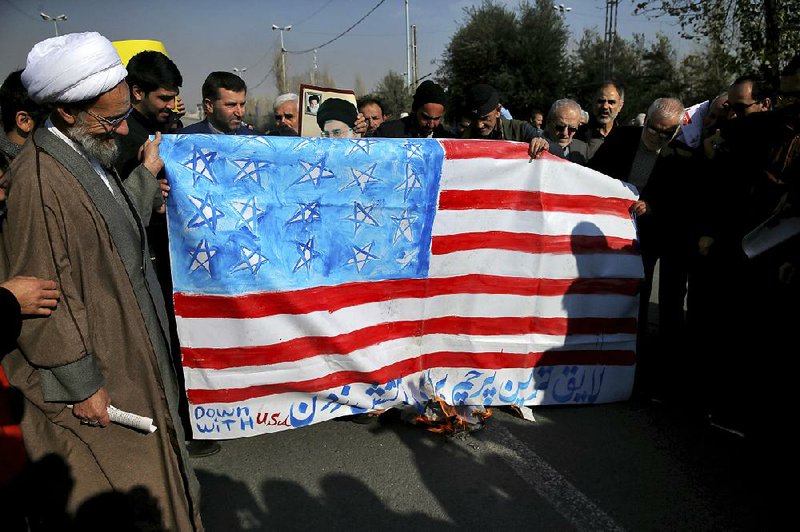TEHRAN, Iran -- Iran's state TV on Saturday showed government supporters rallying a day after the foreign minister said a U.S. move to call an emergency U.N. Security Council meeting to discuss anti-government protests was another Trump administration "blunder."
The state broadcaster showed pro-government rallies in several cities, starting with Amol, in the northern province of Mazandaram, with hundreds of people waving the Iranian flag and chanting slogans against the U.S. and Israel.
State TV described the rally as a "response to rioters and supporters of the riots."
Other pro-government demonstrations were held in Shahin Dezh, in West Azarbaijan province bordering Turkey; the city of Semnan, in the northern Semnan Province; and Shadegan, in the southern Khouzestan Province near Iraq.
The rallies are meant to be a show of force against anti-government protests that broke out in Mashhad, Iran's second largest city, on Dec. 28 and have since spread to several other cities and towns. The protests were sparked by an increase in food prices amid soaring unemployment. Some demonstrators have called for the government's overthrow.
At least 21 people have been killed and hundreds have been arrested. Large pro-government rallies have been held in response, and officials have blamed the anti-government unrest on foreign meddling -- though Iranian President Hassan Rouhani has admitted that not all the demonstrations could be steered from the outside by "Iran's enemies."
The Iranian parliament will hold a special session as soon as today to look into the causes of the protests. The interior minister, the head of intelligence and the security council chief are all expected to attend, the semi-official Iranian Students News Agency said.
A special commission has also been set up to track the fates of those arrested in recent demonstrations, especially those of detained students, a spokesman for Tehran University said Saturday, according to the Iranian Students News Agency.
While there are no official numbers regarding how many people have been arrested over the past week during anti-government protests that have swept the country, an estimated 1,000 to 1,800 people are being detained nationwide, with about 100 of them said to be students.
Lawmaker Mahmoud Sadeghi told the semi-official Iranian Labor News Agency that the whereabouts and circumstances of about 10 of those students is unclear, meaning it's not known which security body arrested them, where they are being held or what charges they face. Some of those detained, he said, had not participated in protests and for unclear reasons were arrested at home.
The fate of those arrested has been the topic of serious concern since Iranian hard-line cleric Ahmad Khatami urged worshippers in a sermon Friday to treat protesters as enemies of Islam, adding that "there should be no mercy for them," particularly flag-burners.
On Saturday, Iranians could access the photo-sharing site Instagram again after it was blocked for the past week. The government has suspended access to the messaging app Telegram, which was being used to publicize the protests. Twitter and Facebook were already banned.
U.S. President Donald Trump has voiced encouragement for the anti-government protesters. The U.S. called the U.N. meeting on Friday, portraying the protests as a human-rights issue that could spill over into an international problem.
Foreign Minister Mohammad Javad Zarif wrote on Twitter after the session that the Security Council "rebuffed the U.S.' naked attempt to hijack its mandate."
He said the majority emphasized the need to fully implement the 2015 nuclear deal and to refrain from interfering in the affairs of other countries. "Another FP [foreign policy] blunder for the Trump administration," he wrote.
Russia portrayed the Security Council meeting as a U.S. attempt to violate Iran's sovereignty. Russia's U.N. ambassador, Vasily Nebenzia, asked whether the Security Council should have had meetings to discuss internal U.S. issues such as protests in Ferguson, Mo., or the Occupy Wall Street movement.
Envoys from several other countries, from China to newcomer Equatorial Guinea, expressed reservations about whether the Security Council was the right forum for the issue.
Emily Thornberry, Britain's shadow foreign secretary, last week told the BBC's Political Thinking podcast that the nation's Labor Party has remained silent about the protests because it takes an approach of "extreme caution" with Iran.
"For example, with these current riots, sometimes they are calling to reinstate the monarchy, sometimes they're calling out against [Ayatollah Ali] Khamenei, sometimes they're calling for Khamenei, sometimes they're calling for the price of eggs," Thornberry said. "It's very difficult, in those circumstances, to actually come to a conclusion as to what political forces are behind the current disputes on the streets of Iran.
"So we take a cautious approach to Iran. We don't want to leap to judgment and say: 'Well, we don't like the regime in Iran, these people are against it, they must be the guys with white hats.' Because it doesn't work like that. We've seen that in Syria, we've seen it in Libya, we see it time and time again."
Information for this article was contributed by Amir Vahdat and Aya Batrawy of The Associated Press; and by Farshid Motahari of Deutsche Presse-Agentur.
A Section on 01/07/2018
